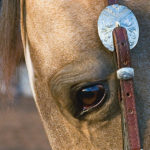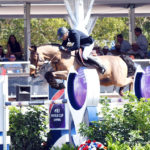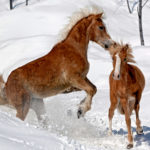Trying to determine, in advance, the makeup and the competitive chances of the U.S. reining squad pointing toward the 2010 Alltech FEI World Equestrian Games was a bit like trying to assess the Austrian alpine ski team years prior to the Olympics.

The truth is there is so much depth of talent that perhaps two dozen individuals were capable of filling one of the four team spots. Perhaps another dozen relatively lesser-known U.S. reiners could have emerged during the qualifiers and gained berths as representatives of Team USA as well.
Even the selection process did little to illuminate the likely team members. To make the team, riders had to enter at least three FEI-approved qualifying events. The qualifying shows began in April and the last took place in May. Those earning a minimum average score of 68 at two different CRIs during the qualification period were allowed to compete at the special ?selection trial? during the NRHA Derby in Oklahoma City in June. Only scores from that selection trial counted toward making the team.
Essentially, whoever had the cool hands and hot horses at the selection trial (not to mention near-flawless performances) were destined to represent the USA in reining at the WEG September 25-October 10, 2010.
Adding more fingerprint smudges to any fortune teller?s crystal ball was the fact that a rider didn’t have to use the same horse or horses in the early events as at the selection trial. Indeed, the ?element of surprise? was part of the fun, as nearly every top trainer had a list of veteran horses that he or she could draw from in order to impress the judges at the selection trial. But that was the finale. The horse (or horses) shown at the trial are the ones that will be paired with each rider at the Games.
Given that reining is the lone FEI discipline born of Western riding and nurtured in U.S. soil, it should be no surprise that the American squad stands between all other nations and the winner?s stage. Since 2002, when reining was first added as an event at Jerez de la Frontera, Spain, the U.S. team has ruled the roost.
While a team win for the U.S.A. is not a foregone conclusion, it’s hard to ignore the stats: team riders Craig Schmersal,Tom McCutcheon, Tim McQuay and Shawn Flarida all rank among just 14 riders in the National Reining Horse Association to have reached the $1 million mark in career arena earnings.
In the last two Games in which reining has been a discipline? Aachen, Germany, in 2006 and Jerez, Spain, in 2002? the team gold medals have gone to the U.S., which also captured an individual gold and silver. The defending 2010 U.S. squad is comprised of former WEG veterans, so Team USA combines experience as well as horsepower.
Team anchor Shawn Flarida, a WEG gold medalist from Springfield, Ohio, is the most decorated reiner in NRHA history with more than $3 million in earnings. He?s been on a streak, winning back-to-back-to-back championships in the NRHA Futurity and NRHA Derby, and most recently the Adequan ?? United States Equestrian Federation Open Reining Championship. The latter victory in July earned him his berth on the U.S. squad. He?ll be on board the Buffalo Ranch?s RC Fancy Step, a six-year-old palomino stallion with over $337,000 in earnings.
Two Million Dollar Rider Craig Schmersal, a WEG gold medalist from Overbrook, Oklahoma, has just come off big wins at the National Reining Breeders Classic (NRBC) and the NRHA Derby level 4 open reserve championship, all on his WEG mount Boom Shernic. The six-year-old stallion, owned by the BoomShernic Syndicate, has over $275,000 in earnings.
Two Million Dollar Rider, Million Dollar Owner, WEG gold and silver medalist, and Hall of Fame member Tim McQuay of Tioga, Texas, has been a legend in the sport for decades and brings the most experience to the team. He?ll be onboard Hollywoodstinseltown, a six-year-old stallion owned by David Silva, Sr., with more than $169,000 in earnings.
McQuay?s son-in-law, Million Dollar Rider Tom McCutcheon, Aubrey, Texas, was on the 2002 gold medal team. His mount, Gunners Special Nite, is a six-year-old stallion owned by Turnabout Farm Inc. that has over $190,000 in earnings. The sorrel was the 2007 NRHA Futurity open reserve champion and intermediate open champion.
The team alternate is Matthew Palmer, 28, the youngest member of the team who has $137,686 in NRHA earnings and multiple championships to his name, including two NRHA world championships, the Carolina Classic Open Derby championship and the Don Burt award during the 2010 Battle in the Saddle. His horse, Whale Of A Whiz, is a 2003 sorrel gelding by Topsail Whiz and out of Pappita Sunrise by Hollywood Jac 86. Whale Of A Whiz is owned by Guy and Joan Palmer and won the CRI-2*/USEF during the 2010 NRBC.
It’s interesting to note that all the U.S. riders are NRHA Professionals, their horses are six-year-old stallions, and all but one have bloodlines that trace to Six Million Dollar Sire Hollywood Dun It (now deceased) or Million Dollar Sire Gunner, both stallions owned by McQuay.
But, as team coach Jeff Petska (chef d?equipe in the parlance of the Federation Equestre Internationale, which overseas international equestrian sport) noted, ?… the other countries are coming with their guns loaded. The leap in the level of competition and the depth of riders since the first Games (in 2002) are impressive.?
Guns might be necessary, but experience will likely be the edge needed to ascend the medal podium. By that accounting, the teams most likely to challenge the U.S. squad include Austria, Canada, Italy, and Germany, although teams from Belgium and Australia could be the ?dark horses? to ride in and steal some medal thunder.
Expected to compete in reining are 112 riders from 29 countries, with medals being awarded in team and individual competition. Not all countries will field full teams of four riders plus an alternate. Several countries will have one to three riders representing them in individual competition.
(Updates toEhringer’s forecast are excerpted from an article in The Reiner, the official publication of the National Reining Horse Association, written by Gavin Ehringer and Kathy Swan.)





